Last updated: 29 February 2024 |
Foreword
Ko Ngā Tiritiri o te Moana ngā maunga
Ko ngā wai huka ngā awa i rere tonu mai
Ko Ngā Pākihi Whakatekateka o Waitaha te whenua
Ko Marokura, ko Mahaanui, ko Araiteuru ngā tai
Tihei mauri ora!The Southern Alps stand above
The snow-fed rivers continually flow forth
The plains of Waitaha extend out
To the tides of Marokura, Mahaanui and Araiteuru
Behold there is life!
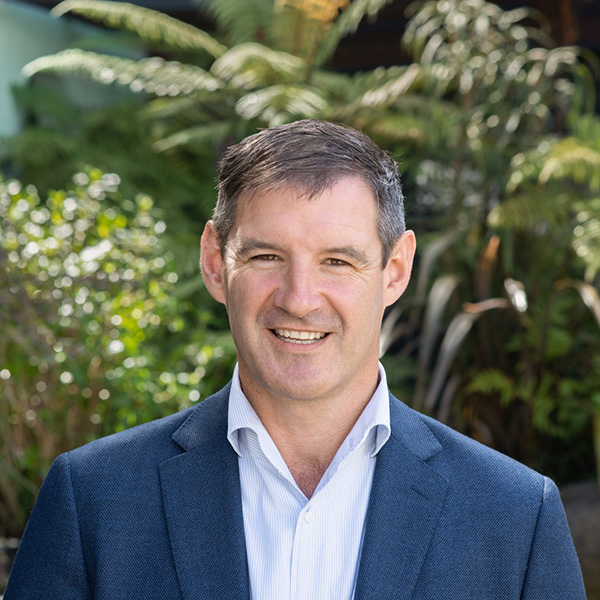
Ki uta ki tai | From the mountains to the sea, Canterbury is an amazing place to visit, live, study, work and do business. We offer an abundance of opportunities in construction, agriculture, manufacturing, professional and technical services, the arts, culture, sport, outdoor and community activities.
This Mayoral Forum’s Plan for Canterbury builds on the 2020-2022 Plan and includes all four aspects of wellbeing (environmental, economic, social and cultural).
We have narrowed our focus and attention to three priority areas: sustainable environmental management, shared prosperity, and climate change mitigation and adaptation. Within these priority areas, we have identified specific actions that we will focus on to make a difference through our leadership, facilitation and advocacy. In January 2024, we refreshed the priorities and actions in our plan.
The Plan provides the opportunity to lead discussions on the drivers for change in Canterbury which include our changing climate; regulation impacting on the future of land use, including greenhouse gas emissions and water quality, the need to capture more of the value from the diverse agricultural food and fibre production in Canterbury and retain that value in the region to create more prosperity for our communities and businesses. We also want to be at the forefront of discussions with central government on opportunities for regional and city deals that will benefit both Canterbury and New Zealand.
While we have refreshed parts of this Plan, the Mayoral Forum will continue its central focus on advocating for governance and decision-making to be devolved to the level of government closest to affected communities.
Our Plan for Canterbury summarises the interests and priorities of local government leaders for Cantabrians. It provides a basis for conversation and partnership with Ngāi Tahu, Government, and the business, community and volunteer sectors. Where our interests align, we can work together for the good of all.
Mā whero mā pango ka oti ai te mahi
With red and black the work will be complete.
We welcome the opportunity to work across our communities and with our partners to achieve our vision for Canterbury to develop sustainably while sharing prosperity and developing resilient communities that are proud of their identity.
Who we are
The members of the Mayoral Forum are the mayors of the ten territorial authorities in Canterbury and the chair of the Canterbury Regional Council (Environment Canterbury).
The Forum is mandated by the Canterbury Local Authorities’ Triennial Agreement and is the primary mechanism for communication, co-ordination and collaboration between councils in New Zealand’s largest region.
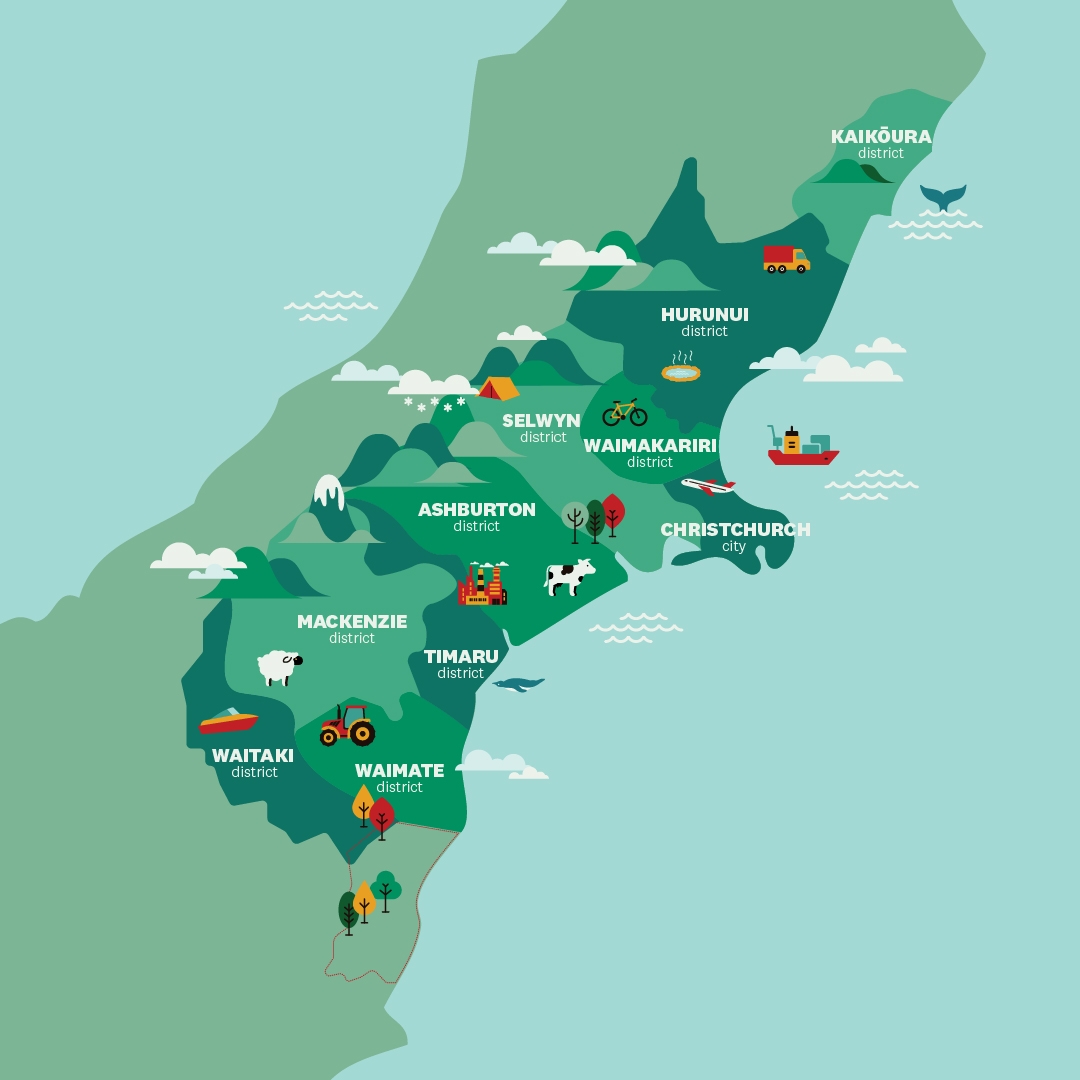
The Forum is supported by the Canterbury Chief Executives Forum, Policy, Corporate, Operations, Economic Development and Communications and Engagement Forums, regional working groups and a permanent secretariat hosted by the Regional Council.

Background to the Plan for Canterbury
Consistent with the purpose of the Local Government Act, the Mayoral Forum’s Plan for Canterbury takes into consideration the four independent aspects of wellbeing (environmental, economic, social and cultural), along with the four ‘capitals’ that enable wellbeing (financial/physical capital, natural capital, human capital and social capital). The Mayoral Forum’s Plan for Canterbury 2020-2022 had five priority issues based on the wellbeing framework for sustainable development:
- sustainable environmental management
- shared economic prosperity
- better freight transport options
- climate change mitigation and adaptation
- three waters services.
We have summarised the achievements of the Mayoral Forum during 2019-2022:
A wellbeing framework for sustainable development
Natural capital – All aspects of the natural environment needed to support life and human activity, including ecosystems and their services, minerals and energy resources.
Financial physical capital – Infrastructure and other physical and financial assets that support incomes and material living conditions.
Social capital – Social connections, attitudes, norms and values that enable social co-operation, including trust, the rule of law, the Crown-Māori relationship and cultural identity.
Human capital – Skills, knowledge and physical and mental health that enable people to participate fully in work, study, recreation, politics and society.
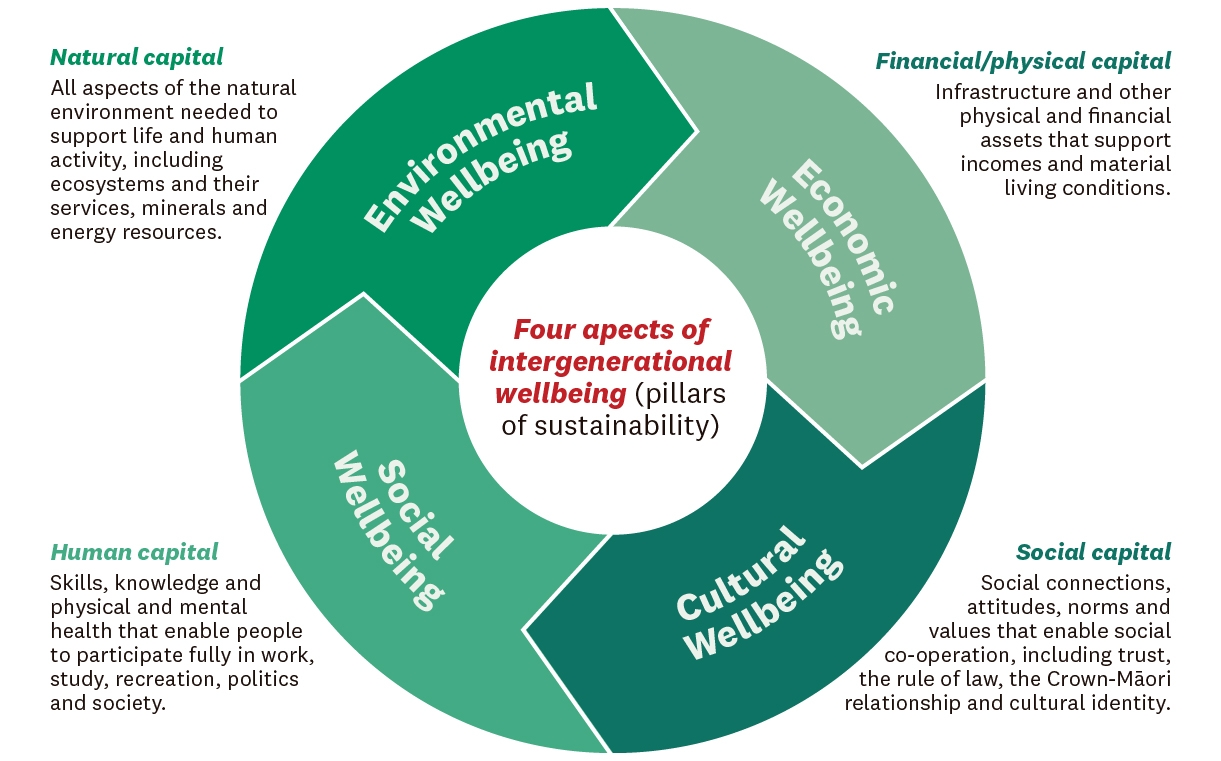
Plan for Canterbury 2023-2025
At the first meeting of the new triennium, the Mayoral Forum agreed that the Plan for Canterbury is fundamentally sound, with minor changes needed to the vision to widen ‘shared economic prosperity’ simply to ‘shared prosperity’ to ensure social prosperity is appropriately captured, and a sharper focus on priority areas for the Forum.
The Plan has also been informed by the Canterbury wellbeing overview.
The Forum agreed that the Plan for Canterbury needs to be more agile and able to be updated (particularly the actions) as the triennium progresses.
With this agility in mind, the plan includes both immediate priority actions and longer-term priorities for the full three years of this term and beyond.
This current version of the Plan for Canterbury has been refreshed to reflect updates to the priority actions to ensure that we are focused on priorities and actions that continue to support our communities now and into the future.
Outcomes from a Canterbury Mayoral Forum workshop, informed by current local government priorities and central government policies formed the basis for refreshing the Plan for Canterbury.
A key aspect in the consideration of the refresh was to lead discussions on the drivers for change in Canterbury which include our changing climate; regulation impacting on the future of land use, including greenhouse gas emissions and water quality, the need to capture more of the value from the diverse agricultural food and fibre production in Canterbury and retain that value in the region to create more prosperity for our communities and businesses.
We also want to be at the forefront of discussions with central government on opportunities for regional and city deals that will benefit both Canterbury and New Zealand.
Our vision and values
Our vision for Canterbury is sustainable development with shared prosperity, resilient communities and a proud identity. We also want to make sure that sustainable development meets the needs of the present while safeguarding the wellbeing of current and future generations.
In this we echo the guiding whakataukī of Ngāi Tahu: Mō tātou, ā, mō kā uri ā muri ake nei – for us and our children after us.
To expand on this, our vision is that in Canterbury, all of us together:
- care for our natural resources to secure both present and future opportunities
- create shared prosperity so no one is left behind
- nurture caring, hope and kindness, standing strong together to withstand and adapt to challenges and change
- celebrate our diverse identities – and take pride in our common identity as Cantabrians.
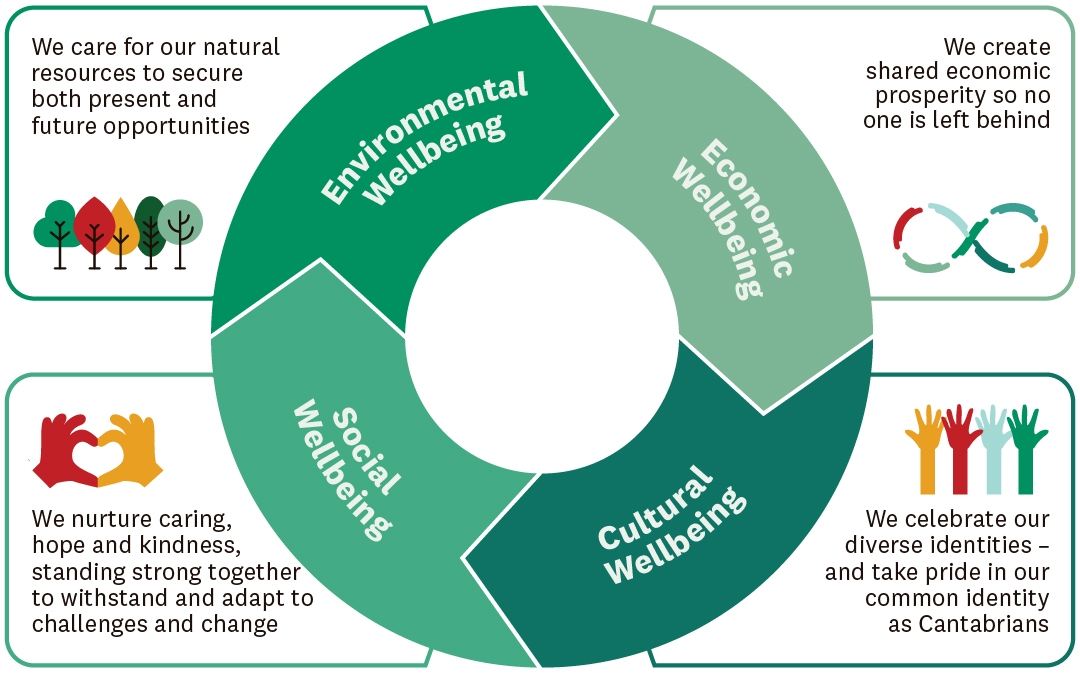
We commit to prudent governance for the future that achieves a balance between the four aspects of wellbeing. While we cannot tackle every aspect of wellbeing equally and everywhere at the same time, no single aspect of wellbeing (environmental, economic, social or cultural) is more important than any other.
We acknowledge our strength as Canterbury and strongly support the concept of localism and subsidiarity in that the function of governance and decision-making should be devolved to the level of government closest to affected communities.
Standing together for Canterbury, we celebrate a win for any part of the region as a win for the whole region. And during hard times and when disaster strikes, we all pitch in to help. A wise and balanced approach to sustainable development requires ‘gifts and gains’, recognition of our diverse interests and values, and reaching an agreement where we can without pushing for consensus where it does not exist.
Our shared future
Canterbury has much to offer residents, visitors, businesses and New Zealand. Our region is the largest by land area, with diverse landscapes, abundant water (over 78,000 km of rivers and streams), and large areas of flat land. We have a strong agricultural base, with innovative farmers and agribusiness making a significant contribution to the country’s GDP.
We are also a strong base for tourism, with the region featuring some of New Zealand’s most spectacular scenery, including mountains, braided rivers, lakes and beaches.
Our economy contributes 13 per cent of New Zealand’s GDP.
As a region Canterbury is well connected nationally and internationally and is the main gateway to Antarctica. Canterbury has the South Island’s major international airport (Christchurch), a regional airport (Timaru), two seaports (Timaru and Lyttelton) and inland ports at Rolleston.
Through the Mayoral Forum we have well established structures and an established coordinated approach to working for our communities. We want to use these to our advantage to support discussions on addressing the drivers for change in Canterbury.
Our councils are facing significant challenges and change over the coming years. The impact of inflation, central government policies and addressing climate change resilience will influence the shape and functions of local government and the communities we serve.
Ensuring a strong local voice through any changes and into the design of outcomes will be important to ensure the continued success of our local communities.
The Canterbury Mayoral Forum will take every opportunity to influence central government policies and programmes to support local communities and to influence and shape local government’s future for the Canterbury community. There is a willingness to work with neighbouring Mayoral Forums and groups to extend this to a Te Waipounamu/South Island collaborative governance future.
As part of our advocacy work, the Mayoral Forum makes considered submissions on government reform programmes and other legislation to provide a whole-of-Canterbury view. This will continue as the term progresses. Submissions on previous government reform legislation and He mata whāriki, he matawhānui (review into the future for local government draft report October 2022) are available in our resources section.
A key priority for the Mayoral Forum this triennium is to work collectively, and with central government, to deliver positive and enduring outcomes for our communities, while ensuring that our communities can see the ‘local’, and in particular ‘their local’.
Our priorities
To achieve its long-term vision, the Mayoral Forum has identified three priority issues for the Mayoral Forum’s leadership, facilitation and advocacy in this local government term:
- Sustainable environmental management of our habitats (land, air, water and ecosystems) – focusing on land use and freshwater management
- Shared prosperity for all our communities – focusing on building on our economic strengths and developing emerging sectors, growing, attracting and retaining a skilled workforce, improving the transport network and coordinating strategies for housing our communities
- Climate change mitigation and adaptation – reducing our carbon footprint, working together on climate action planning, building community resilience, and making our infrastructure as strong as it can be.
The selection of these three priority areas does not mean that other issues are unimportant. Some have greater sub-regional than regional significance (for example public and active transport is primarily an issue for the Greater Christchurch Partnership), some issues are well on the way to being addressed through other avenues, and there are a number of issues of importance that the Mayoral Forum care deeply about but have little or no ability to influence.
As in 2019, the Mayoral Forum used three sets of criteria to narrow a long list of issues.
Importance
- Is this issue critical to the wellbeing of the region in 5-10 years’ time? If we do nothing, will the issue still be important in 5–10 years’ time?
- Does this issue have sufficient scale, scope and complexity to require a regional focus?
- Is this issue already being managed effectively by another agency or organisation?
Democratic mandate
- Is there strong public concern about the issue?
- Do our councils (elected members) care about the issue?
Impact
- Can the Mayoral Forum influence outcomes in a measurable way and if so, how?
In determining these priority areas, we have used Treasury’s Living Standards Framework to prompt our thinking about wellbeing and policy impacts, and the interdependent nature of wellbeing across the four aspects that make up the wealth of Aotearoa New Zealand – the natural environment, financial and physical capital, social cohesion, and human capability.
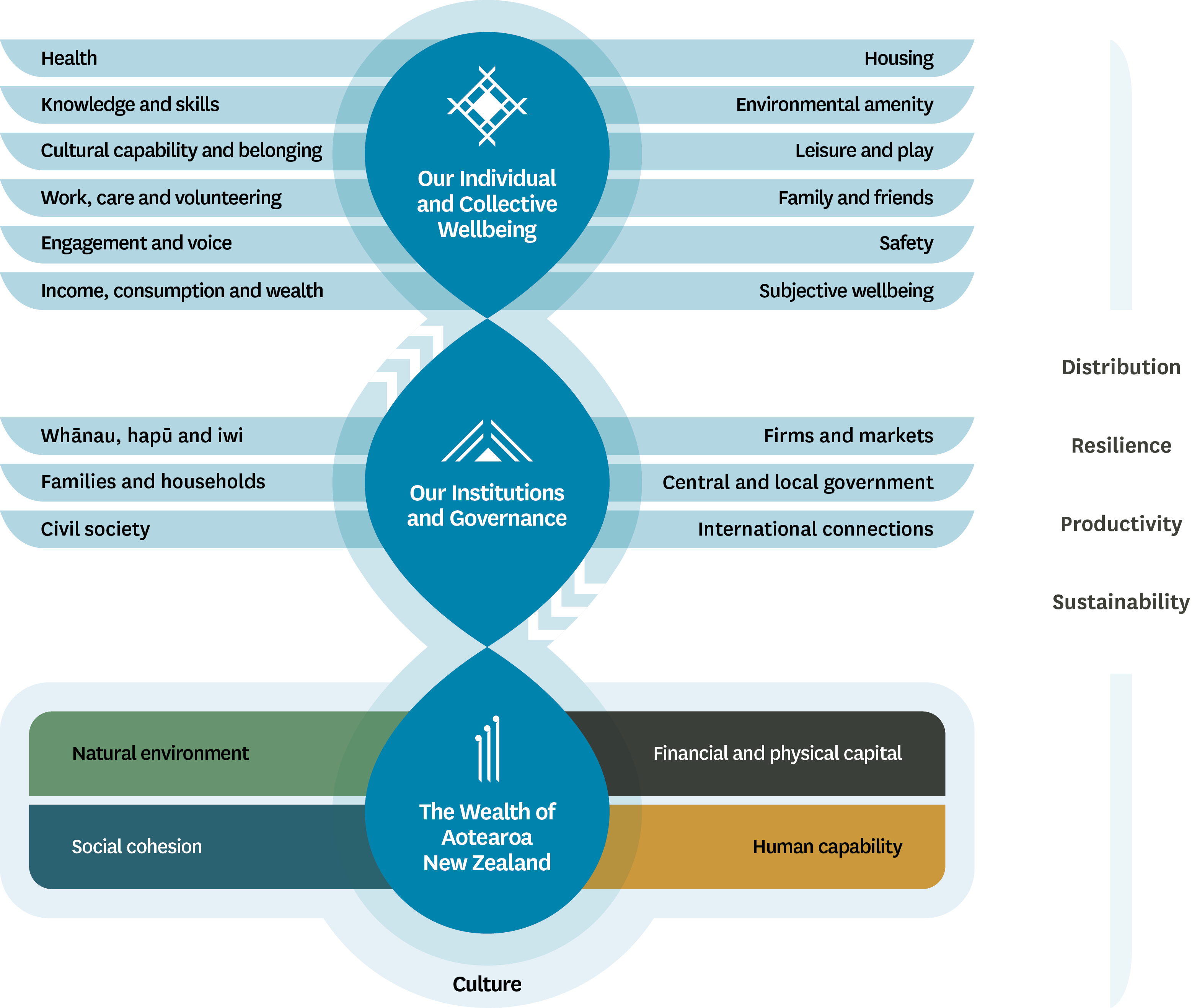
Why are these our priority issues?
Sustainable environmental management of our habitats
Canterbury is New Zealand’s largest region by land area. We have:
- 21% of New Zealand’s highest-quality soils
- 19% of the total area farmed in New Zealand
- Around 70% of New Zealand’s groundwater
- 64% of the country’s irrigated land area
- More than 4,700 lakes and tarns, over 78,000 km of rivers and streams, 800 km of coastline and 11,620 km² of coastal marine area.
Past land use decisions, agricultural intensification since the 1970s and increased urbanisation have, however, increased pressure on the region’s rivers, streams and groundwater aquifers, and on indigenous biodiversity.
Canterbury Water Management Strategy
In 2009, the Mayoral Forum launched the Canterbury Water Management Strategy (CWMS) and continues to oversee its implementation. In 2019, the Forum commissioned the Fit for Future project to develop 2025 and 2030 goals for the ten target areas of the CWMS and a regional work programme to support the delivery of the strategy.
National and regional freshwater policy has changed since the inception of the CWMS. Water is seen as an enabler for regional economic development, and more recently the relationship between water, food production and energy security and how these elements are linked to community resilience have surfaced. Consideration of water issues also needs to take place in the context of impacts/influences of climate change and how this may shape water and land management decisions going forward.
A review of the zone committees, which support the delivery of the CWMS will take place over 2024. The review will focus on the evolution of zone committees and local leadership in freshwater management, taking into account the changes to national direction and freshwater management.
The Mayoral Forum will continue oversight of the CWMS, taking into consideration the changing national and regional policies, along with the relationship between water, food production and energy security.
Flood management solutions
Flooding is the most commonly occurring natural hazard in New Zealand – we only have to look across the country over the past few years to see this. Canterbury, with its more than 78,000km worth of rivers and streams, continues to be at huge risk of more events like those we saw in 2021. Future flood management solutions must consider ecological, environmental, whole of catchment and Te Mana o te Wai considerations, alongside spatial planning, managed retreat, building control and community preparedness responses.
The cost of improving the resilience of the protection provided by current schemes is significant, with regional councils estimating the shortfall of investment to be in the order of $150m per annum nationally. Flood protection schemes protect local and national assets and contribute to more sustainable regional economies. Permanent co-investment in flood protection shifts the focus from disaster relief and rehabilitation towards necessary top-of-the-cliff mitigation of flood risks, with reduced long-term costs.
The Mayoral Forum will continue to support the Te Uru Kahika – Regional and Unitary Councils Aotearoa’ business case for permanent co-investment from the Government in river management for flood protection, an updated version of which was presented to the Government in 2022.
Protecting our biodiversity
A key part of sustainable environments is also enabling flourishing biodiversity. Native biodiversity in New Zealand is unique – many of our plants, birds, bats, insects, fungi, reptiles and fish are only found on our islands.
We have a collective responsibility to safeguard our biodiversity for present and future generations. As part of this, the Mayoral Forum supported the formation of the regional Biodiversity Champions in the last local government term, an elected member group with representatives from all of Canterbury’s councils, who work together to promote biodiversity and advocate for the role of councils and communities in weaving biodiversity through Canterbury’s living and working landscapes.
The Mayoral Forum will continue to support the Biodiversity Champions as the key conduit for a shared regional approach to biodiversity, facilitating work across the region on the revitalisation of the Canterbury Biodiversity Strategy and the development of a regional biodiversity monitoring framework.
Shared prosperity for all our communities
We want to build on Canterbury’s strengths and create shared prosperity for all our communities.
Sharing prosperity amongst all of Canterbury’s communities means all of us can benefit, ensuring better and more sustainable futures for ourselves and future generations.
Canterbury has many natural advantages, significant infrastructure, and a range of tertiary education providers and research institutes. We are well-placed for research-informed innovation in sustainable primary production and high-value manufacturing that lifts productivity and the prosperity of our region.
Agriculture and other industries
There are opportunities to capture more of the value from the diverse agricultural food and fibre production in Canterbury and retain that value in the region to create more prosperity. These opportunities are also linked to the regional approach to water management, climate change mitigation and adaptation and energy security.
Despite this, Canterbury’s GDP per person still lags behind the country as a whole. To lift wages and incomes, we need more skilled jobs and skilled workers to fill them – through ‘growing our own’ but also by attracting and retaining newcomers through internal and external migration.
The Mayoral Forum will continue to advocate with the Government for immigration and skills policies that work for Canterbury.
To build on our strengths, we need a sustained focus on the region’s key industries, as well as an eye to transitioning the economy and developing emerging sectors.
We know that agriculture plays a significantly more important role in Canterbury’s economy than those of Auckland or Wellington, and generates a significant amount of economic activity from supporting industries including manufacturing, transport and warehousing, and financial and insurance services. Diversifying and adding value to our agricultural production improves market resilience and has the potential to reduce environmental impact.
The Mayoral Forum will continue to encourage, support and advocate for research and investment in diversifying and adding value to our agricultural production.
Energy security will be critical for Canterbury to be able to continue to pick up and support opportunities for the region. There are strong connections in Canterbury between energy, water, food production and climate change. There are opportunities to support diverse approaches, including new technologies in the energy sector, as renewable energies become an increasingly important part of responding to climate change risks. We need to be ready to pick up and support opportunities in these emerging sectors.
Canterbury has an opportunity to be at the forefront of an energy transition to attract and retain talent, investment and technologies.
The Mayoral Forum will support the region to foster partnerships, investigate barriers, and harness opportunities to improve our energy security and systems in ways that maximise benefits for our community economy and environment.
In addition, Canterbury is home to a burgeoning aerospace industry because of its topography, infrastructure and proximity to international air and sea ports. There are exciting prospects ahead that will benefit us all.
Transport
Our region has a vast transport network. It is how we connect with each other, within Canterbury, the South Island, the rest of the country and internationally. Transport strongly influences economic development, supporting supply chains that are critical for getting our exports to market and imports back to us. The system faces a number of challenges; an increase in the number of severe weather events around the country means that the transport network needs to be more resilient than ever. Climate change effects highlight the importance of reducing transport emissions and encouraging the use of sustainable modes of transport.
Maintaining and renewing our transport system to keep it fit for purpose requires significant investment, whether it be to maintain the existing network, develop new roading options or support increased public transport. Current funding sources from local authorities and the National Land Transport Fund will not meet current needs, particularly when faced with resilience issues.
It is estimated that $11 billion is required over the next 10 years to materially impact the range of issues transport is facing in the region. Although there is no simple solution, there are options to be investigated. The Mayoral Forum will continue to support the Canterbury Regional Transport Committee to investigate options to increase the level of funding available for the transport network in Canterbury.
The Mayoral Forum will advocate with government to review transport funding legislation to better empower local authorities to develop local funding solutions.
Our communities
Prosperity is also about looking after ourselves and each other, celebrating our diversity and taking pride in our common identity as Cantabrians. We know that the pandemic has exacerbated the demand for mental health services in Canterbury, which was already elevated following the 2010–11 earthquakes and the 2019 terrorist attack. Hearteningly, in the 2021 General Social Survey, 85% of Cantabrians rated their overall life satisfaction between 7-10 (on a scale where zero is completely dissatisfied and 10 is completely satisfied). This was higher than the national average, as well as higher than those in Auckland and Wellington respectively.
The Mayoral Forum maintains close and regular engagement with the Regional Public Service Commissioner, who is leading a joined-up work programme across Government on the following social wellbeing priorities:
- all tamariki and rangatahi in Canterbury reach their full potential (including actions focused on school engagement and attendance)
- transitioning Canterbury to become a more highly productive and sustainable economy
- equitable access to services, safe housing and tenure
- addressing family violence and sexual violence
- ensuring whanau have access to services, and resources and live in healthy environments that support mental wellbeing.
The Forum has much to contribute to this work programme given how close local government is to its communities. We will continue to support and monitor progress in these critical priority areas.
Relatedly, one of the priorities for the Forum this term will be developing a regional housing strategy. Many councils own and manage social housing, as well as supporting trusts and other community organisations to build affordable housing. Safe, secure and affordable housing is key to enhancing wellbeing and therefore prosperity. We know that in some parts of Canterbury, the key issue is the quantity and/or quality of social housing, while in others it is access to affordable housing, and in other areas, the issue is the volume of housing stock available – and in some places, it is a mix of all three.
Housing shortages can cause significant issues for the ability of businesses to employ the staff they need, particularly in rural and regional areas. The tight accommodation market puts off prospective employees and in some areas, employers have given up advertising roles because they know even if they can find the labour, they cannot find housing for them.
The labour market, particularly for seasonal workers, is an incredibly tight labour market, which in some instances, is driven by the lack of affordable worker accommodation.
The Mayoral Forum will develop a regional housing strategy that will identify the range of housing issues affecting communities across the region and a pathway forward to improve them.
The Canterbury Mayoral Forum housing strategy will acknowledge and build on the work undertaken by the Greater Christchurch Partnership’s Housing Action Plan.
Community preparedness
The Forum also recognises we live in a landscape with a range of natural hazards, particularly floods, fires and earthquakes. There is a 75% probability of an Alpine Fault earthquake occurring in the next 50 years, and there is a four out of five chance that it will be a magnitude 8+ event.
The Forum wants to ensure that our communities are as prepared as possible for such an event and that people, homes, livelihoods and communities are protected from the worst impacts. The Mayoral Forum strongly supports the work of the Canterbury Civil Defence Emergency Management Joint Committee preparing for major natural hazard incidents.
Climate change mitigation and adaptation
Climate change is the biggest challenge of our time and has systemic and intergenerational impacts. It affects our weather, health and wellbeing, natural environment, taonga species, mahinga kai, food production, biosecurity, infrastructure, and economy.
Responding to climate change is an urgent issue. We are already seeing its impacts in more frequent droughts, extreme weather events and flooding, coastal erosion, and increased fire risk. The May 2021 floods in Canterbury are a clear example of this.
As a region, we need to reduce our carbon emissions and do what we can to mitigate the effects of climate change. We also need to prepare for the changes that are ahead of us and respond to the social, environmental and economic effects of our changing climate.
The first Emissions Reduction Plan was released in 2022. It is the first statutory plan, under the Climate Change Response Act, to require the Government to act to reduce emissions right across the economy, support the transition, and seize the opportunity to lower the cost of living and improve living standards.
The National Adaptation Plan was released in 2022. The Plan sets out how New Zealand will build resilience for an uncertain future. It contains more than 120 actions, and the Ministry for the Environment has published a summary of what the Plan will mean for local government more specifically.
Responding to climate change underpins the priority we give to environmental management and extends to:
- measuring and reducing our own carbon footprint as individual councils
- contributing to the design of Government policy and regulation and advocating for strong Government leadership through multi-party agreements to minimise political short-termism
- planning ahead in our Long-Term Plans and 30-year Infrastructure Strategies to make our infrastructure as resilient as it can be.
Regional response to climate change
The Canterbury Mayoral Forum published the Canterbury Climate Change Risk Assessment in early 2022, which has been designed to build a shared understanding of climate change risks across the region and to help us prepare and respond effectively. The assessment centres around a framework that aligns both a Te Ao Māori worldview and the National Climate Change Risk Assessment (NCCRA) framework.
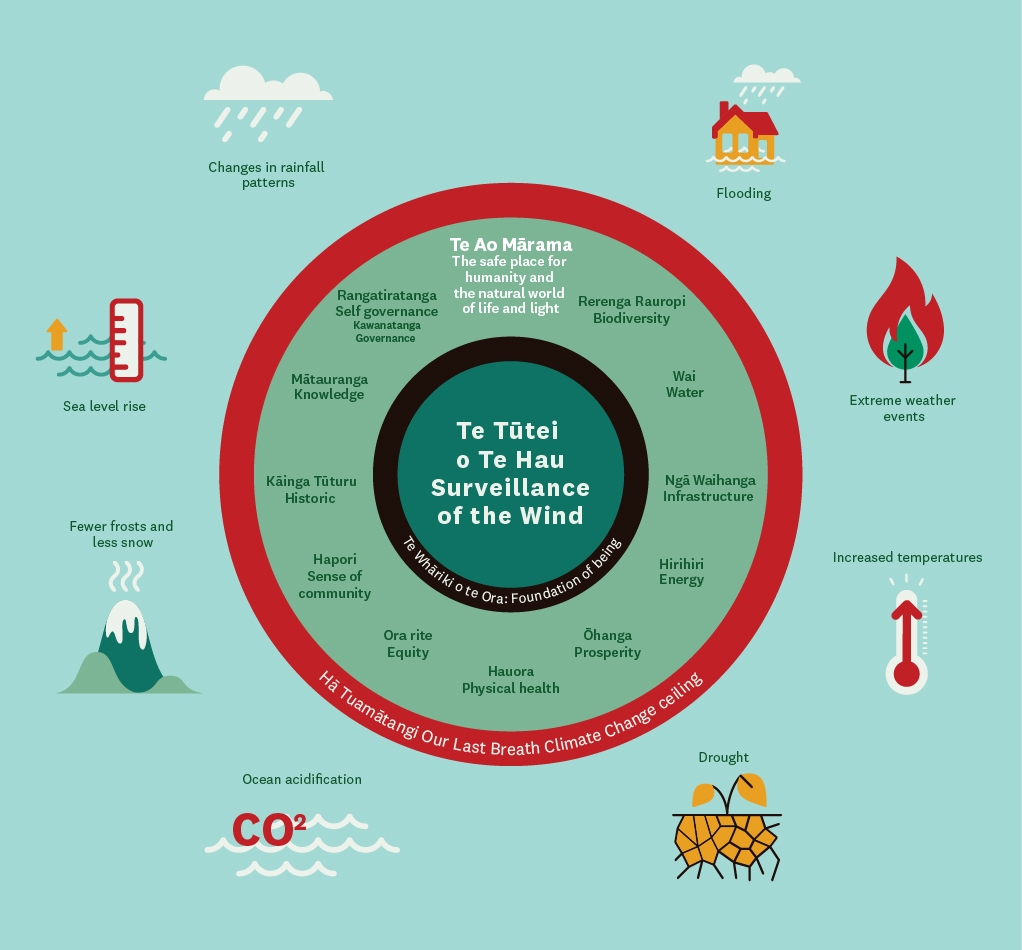
Te Whāriki o te Ora – The black ring represents whakapapa, or genealogical connection, that extends from the spiritual realm to that of the human domain. It recognises that humans cannot exist without basic needs and a social foundation.
Te Ao Mārama – The green ring represents the area in which humans can exist when we are functioning within the capacity of our ecosystems. Ngā pono (the values) identified within this circle are critical for us to understand and respond to when considering climate risk.
Hā Tuamātangi – The red ring represents the upper limit in which humans, environments and ecosystems can continue to exist. Beyond this boundary, it is no longer possible to respond to risks proactively.
Understanding the risks and opportunities of climate change now and into the future is a vital step in our efforts to curb its long-term impact in our region.
The Mayoral Forum will oversee a Canterbury-wide climate change partnership plan, which will confirm a collaborative vision for regional adaptation planning, an ‘urgency assessment’ to support prioritising climate actions, and a funding plan laying out a regional/aligned approach for accessing finance for climate actions in Canterbury.
Relationship engagement and management
Building positive and enduring relationships with mana whenua, the business community, central government, and our wider communities will play a key part in achieving our goals this term.
In working alongside mana whenua, a joint understanding of what partnership means will be important. The Forum wants to grow its collaboration with Te Rūnanga o Ngāi Tahu as the Treaty partner in the region, as well as with the 10 Canterbury Papatipu Rūnanga. We are keen to explore what enabling mechanisms we must assist the 10 Rūnanga with engaging and collaborating with us on the key issues for our region and communities.
The Mayoral Forum recognises the need to work across business, government at all levels, mana whenua and communities. Engaging with key influencers across the region and beyond to work collectively to address the drivers for change in Canterbury will be one way to create more prosperity for our communities and businesses.
We must also focus on strengthening our relationships with Ministers and Members of Parliament. We can do this by:
- leveraging our individual relationships for the benefit of the whole region
- actively making the most of opportunities to engage with Ministers and our local Canterbury-based MPs
- making better use of advocates through our relationships with regional public sector officials
- take opportunities, such as the Review into the Future for Local Government process, to demonstrate the value and importance of local government
- showcase our successes and the resulting benefits to NZ Inc.
The Government’s policy announcements about regional/city deals and a provincial growth fund affords us the opportunity to demonstrate the importance of Canterbury to New Zealand’s economic prosperity and the significance of fit-for-purpose infrastructure to future-proof our agricultural and tourism industries. We intend to engage with the Government at the earliest opportunity on this.
Our relationships with the business community and tertiary education providers are also crucial to achieving some of our economic development and climate resilience aspirations. We need to work closely with industry groups and representative organisations to understand what the issues are so we can target our advocacy appropriately.
Finally, we don’t underestimate the importance of our relationship with our communities. Engaging Canterbury’s communities in our work, and the work of local government more widely can only serve to strengthen local democracy.
One of the key things we can do is highlight and promote the importance of local government to everyday lives – people use a range of council services each and every day, from when they turn on the shower in the morning, use the transport network to get to and from work or school, borrow a library book, use a swimming pool or simply walk around a park.
Action plan to address priorities
The Mayoral Forum will continue oversight of the Canterbury Water Management Strategy, taking into consideration the changing national and regional policies, along with the relationship between water, food production and energy security.
The Mayoral Forum will continue to support the Te Uru Kahika – Regional and Unitary Councils Aotearoa’ business case for permanent co-investment from the Government in river management for flood protection, an updated version of which was presented to the Government in 2022.
The Mayoral Forum will continue to support the Biodiversity Champions as the key conduit for a shared regional approach to biodiversity, facilitating work across the region on the revitalisation of the Canterbury Biodiversity Strategy and the development of a regional biodiversity monitoring framework.
The Mayoral Forum will continue to advocate with the Government for immigration and skills policies that work for Canterbury.
The Mayoral Forum will continue to encourage, support and advocate for research and investment in diversifying and adding value to our agricultural production.
The Mayoral Forum will support the region to foster partnerships to investigate barriers, harness opportunities to improve our energy security and systems in ways that maximise benefits for our community economy and environment.
The Mayoral Forum will advocate with government to review transport funding legislation to better empower local authorities to develop local funding solutions.
The Mayoral Forum will develop a regional housing strategy that will identify the range of housing issues affecting communities across the region and a pathway forward to improve them.
The Mayoral Forum will oversee the completion of the Canterbury-wide climate change partnership plan, which will confirm a collaborative vision for regional adaptation planning, an ‘urgency assessment’ to support prioritising climate actions, and a funding plan laying out a regional/aligned approach for accessing finance for climate actions in Canterbury.
